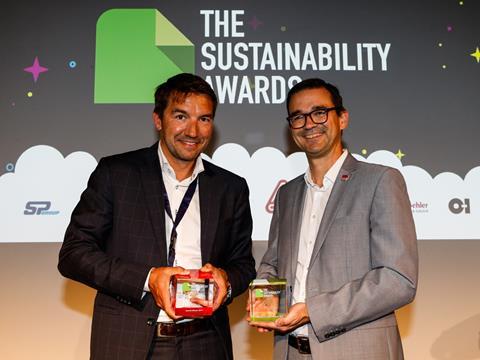
The pioneering HolyGrail project, led by Procter & Gamble and facilitated by the Ellen MacArthur Foundation, has been announced as the overall winner of the Sustainability Awards 2019. It also scooped up the ‘Driving the Circular Economy’ award.
The project is a result of three years of innovation in the improvement of post-consumer recycling using chemical tracers and digital watermarks, with the aim of moving closer to a circular economy.
Once packaging is designed for circularity, the collection challenge and consumer participation are solved, high quality sorting is crucial to increase the current poor recycling rates. Through improved sorting, the quality and quantities of recycled materials will be greatly increased, thereby helping the transition to a circular economy as more and better recyclate can enter the marketplace. As reported last year in Packaging Europe, the HolyGrail Pioneer Project (run by participants in the New Plastics Economy, and led by Procter and Gamble’s Gian De Belder) is investigating the potential role of both digital watermarking and chemical tracers in improving accuracy of recycling. Basic proof-of-concept has been established (P.R.I.S.M. for chemical tracers in 2018 and Filigrade and Digimarc for digital watermarks in 2019).
Gian De Belder spoke to Packaging Europe about the initiative (before we had announced the identity of the winners). “By making the packs more intelligent through digital watermarks, an add-on module linked to existing sorting equipment can read these ‘barcodes’ for recycling and can do a more effective job,” he said. “This includes jobs that are not possible today, like making a distinction between food and non-food packs, sorting efficiently all coloured packs including blacks, proper sorting of full-body shrink sleeved bottles, proper identification of recyclable vs compostable packaging, efficient sorting of multi-layers and many more. The great thing about digital watermarks is that one technology can be used along the full lifecycle of a pack: from packing lines through to improved sorting at material recovery facilities and recyclers.”
Major progress has been made in the digital watermark technology, where codes that are invisible to the human eye are integrated in either printed materials or directly into a mould. In addition to its huge potential for circularity, digital watermarking has great potential to bring disruption into other fields. It effectively facilitates smart, interactive packaging, providing added functionality beyond circularity across the value chain, for inventory management at filllers, anti-counterfeit checks in stores and fast check-outs at retailers (making 2D barcodes and QR codes redundant). In terms of consumer engagement, mobile phones can now easily read a package, adding features such as transparency, coupons, how to use/dose a product, etc. According to HolyGrail, major retailers Wegmans and Walmart in the USA and others in Europe are signing up for this technology.
“The current low EU recycling rates are mainly related to lack of infrastructure/collection schemes and participation of consumers, next to inefficient sorting,” Gian De Belder observed. “We wanted to bring solutions for the latter. During our first Open House (a key focus has been EU associations) we had many people joining us during the proof-of-concept trials and each of these associations truly embrace the technology. Next steps have been identified and we hope to soon bring it into a (test) market to further learn and prepare for full roll out.”
A logical next step for HolyGrail will be to upscale from an R&D test line to a (semi-)industrial line, after which roll-out of this technology can take place.
On the broader sustainability challenges facing packaged goods, Gian commented: “We need to work solutions that offer benefits in both LCA metrics and recyclability profile, as the ultimate goal is to become fully circular. We need to speak all the same language, and here harmonisation of all aspects – especially recyclability definitions – is crucial. We need to move away from opinion-based assessments and create scientific-based assessments. Note the great work currently being performed by Recyclass, which should create a level-playing field for all!
“Clearly, sustainability in packaging needs to be achieved by many stakeholders acting together, not by someone with a silver bullet. Thinking about the wider picture, what areas of innovation or action would you like to see across the value chain in the coming years to meet the demands of nature and society? I am a true believer in cross-value chain collaborations as no single company can solve these challenges on their own. HolyGrail is a perfect example of this.”
Gian De Belder also served as a member of the Sustainability Awards 2019 judging panel. Consistent with the competition rules governing potential conflicts of interest, he recused himself from voting or commenting on the HolyGrail submission.










